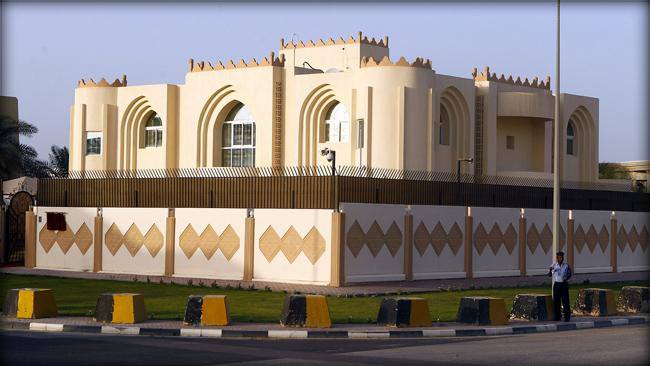KABUL‘s political bureau in Doha has touched off rifts within the insurgent movement, with hardliners weighing the creation of a new group, knowledgeable sources revealed on Sunday.
As part of plans to initiate negotiations with the High Peace Council‘s Islamic Emirates” at the building.
However, the Karzai administration reacted in a knee-jerk fashion to the raising of the flag and the use of nomenclature by Taliban, as well as the US support for the Taliban’s move. As a result, the president suspended talks on an important security pact with the US.
Now that both Kabul and Washington have voiced their willingness for talks, the Taliban have blamed the United States for being in a ‘state of confusion’ and lacking a ‘firm stance’ on the Qatar process. They also rap the reluctance of Presidents Obama and Karzai to hold dialogue with their negotiators in Doha.
Sources close to the Afghan government said the rebel movement was sharply divided over the opening of the Qatar office. As mistrust among the parties continues to rise, some ultraorthodox figures within the rebel leadership plan to form a splinter group called Fidayee Mahaz (Suicide Front).
In the first round of talks, the Taliban negotiators in Qatar and Obama administration’s representatives are to discuss a prisoner exchange arrangement. The insurgents are willing to swap a US soldier held captive since 2009 for five of their senior operatives held at Guantanamo Bay. US Army
Sgt. Bowe Bergdahl of Hailey, Idaho, vanished from his base in southeastern Afghanistan four years ago. Soon after the opening of their office in Doha, Taliban spokesman Shaheen Suhail said Bergdahl was in good condition. In return for his release, the fighters want Khairullah Khairkhwa and Mullah Mohammed Fazal to be freed.
But the source disclosed the Taliban’s representatives in Doha were not authorised to take any decision of exchanging prisoners. He said the US soldier had been captured by an insurgent named Ismail Sulemanzai, who is currently imprisoned in Pakistan. The American service member is held hostage by Paktia-based rebels.
The official, speaking on condition of anonymity, claimed there were sharp divisions among the Taliban over the removal of their flag and the controversial plaque from the Qatar office. The split has reportedly prompted the hardliners to form a new party.
But Zabihullah Mujahid, the movement’s spokesman, spurned the claim as propaganda by their opponents. He said their rivals had been spreading rumours about intra-Taliban differences over the past 12 years.
“We stand firmly united and each of our decision is taken by our leader on the basis of consensus. There is no question of any rifts within our movement,” Mujahid told Pajhwok Afghan News. Their foes would never succeed in driving a wedge among the Taliban, he continued.
By the same token, political commentator Wahid Muzhda also characterised talk of differences among the insurgents as part of the ongoing war. Some quarters, averse to the Doha process, were giving such statements, he explained.
He said the Taliban’s negotiators in Doha had been nominated by Mullah Omar himself in line with requests from Qatar and American governments. Muzhda also dismissed the impression that the Taliban’s Qatar team had no power to negotiate prisoner swap deals.
Inayatullah Kakar, an expert on the insurgency, also denied cracks in the Taliban over the Qatar office. However, he acknowledged a mismatch of perceptions on how to carry forward the process.
“Some moderate elements are of the opinion the Doha office should have been opened after a thorough analysis of the current situation and without any foreign pressure,” the expert added.
The US is no longer playing as crucial a role in Afghanistan as it did three years ago, according to Kakar, who went on to argue any solution had to stem from domestic actors.
Disagreeing with the notion of Suicide Front’s creation, he thought the fighters both in Afghanistan and Pakistan had little chance of a secure future and the peace slogan had in fact been raised by them.
A strong group within the Taliban had been emphsising on an intra-Afghan mechanism of understanding and coordination, Kakar said. “Wielding a strong influence at Leadership Council and commission levels, they might have been a factor in the sudden inauguration of the Qatar process…”
Kakar said the movement, fearing the moderate group could wrest the peace initiative, opened the office to prevent it from calling the shots.
Another political analyst, Dr, Faiz Mohammad Zaland, said reports about splits in the movement were far from true. He also downplayed talks of moderates and hardliners, saying it was nothing more than propaganda.
An attack on Mullah Motasim in the port city of Karachi and the detention of Maulvi Ismail by Pakistani security forces had fuelled such rumours that eventually turned out to be false, he maintained.
The Taliban realised full well the fact that divisions would create problems for the movement, he argued, saying that was why the insurgents stood united. He believed this unity would remain intact as long as Mullah Omar remained Taliban’s supreme leader.
mud
Visits: 3









GET IN TOUCH
NEWSLETTER
SUGGEST A STORY
PAJHWOK MOBILE APP